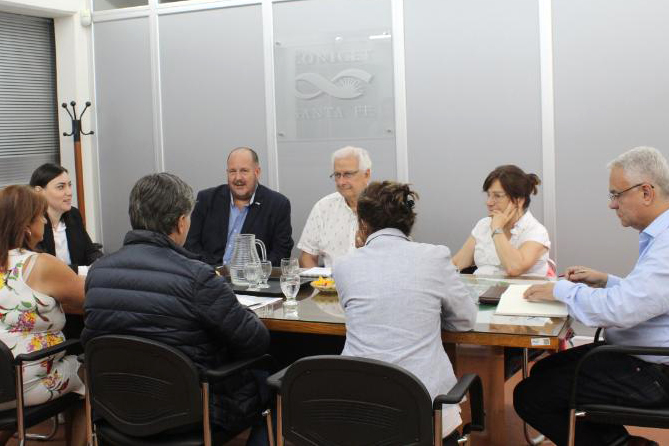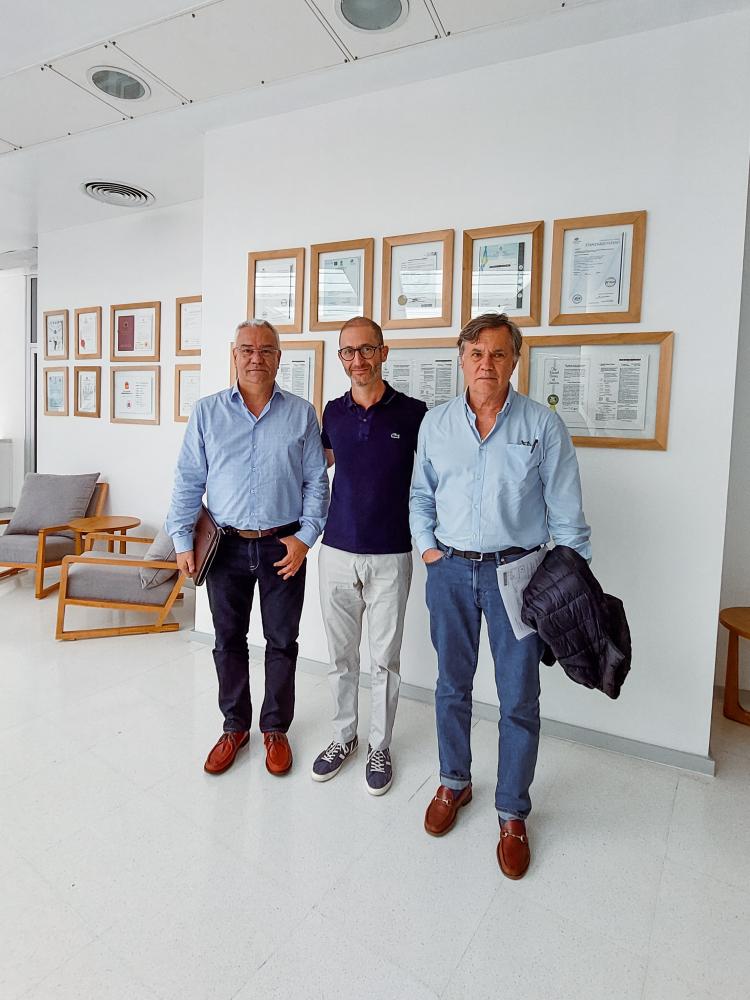Litoral Agrobiotechnology Institute (IAL) in Argentina is strengthening ties with IICA to train top-flight professionals to develop knowledge intensive agriculture

Santa Fe/Rosario, Argentina, 17 February 2023 (IICA). The Litoral Agrobiotechnology Institute (IAL), a premier public institution in Argentina, dedicated to research and innovation, will deepen its ties with the Inter-American Institute for Cooperation on Agriculture (IICA), with the latter assisting in human resource development in new agricultural technologies and providing international recognition for the scientific institution.
This course of action was agreed on by prestigious Argentine scientist and Director of the IAL, Raquel Chan, and the Director General of IICA, Manuel Otero.
Chan—a biochemist and plant biotechnology specialist who led the development of the drought-resistant HB4 soybean and wheat—welcomed Otero to IAL Headquarters in Santa Fe, the capital of Santa Fe province in Argentina.
Otero then travelled to Rosario, another city in Santa Fe, to meet up with Federico Trucco, the CEO of Bioceres – the company that jointly developed the drought-tolerant HB4 soybean and wheat with the IAL.
The IAL was established in 2008 by the National Scientific and Technical Research Council (CONICET)—a leading public entity devoted to knowledge creation in Argentina—and the National University of Litoral (UNL). Chan, who heads the IAL, was conferred with the “IICA Chair in Biotechnology and Sustainable Development” in January 2022, for her contribution to strengthening national science and technology systems.
Discussions during the meeting surrounded IICA’s support for the “Escuela de Biofábricas” project that the IAL will be undertaking along with the Santa Fe provincial government. The initiative is aiming to impart theoretical and practical knowledge on cultivating crops whose multiplication requires biotechnology tools, including the integrated development of research, extension services and their linkage to technology.
The support will be formalized by way of a framework cooperation agreement signed between IICA and the scientific institution, which undertakes research and the development of technologies in various disciplines related to biotechnology application in agricultural production; the transfer of technology to the production sector and the training of human resources, specializing in plant biotechnology.
Also in attendance at the meeting were the Director of CONICET Santa Fe, Carlos Piña; Deputy Director, Aldo Vecchietti; the Secretary of Science, Technology and Innovation of Santa Fe, Marina Baima; and the Dean of the Faculty of Biochemistry and Biological Sciences of the UNL, Adriana Ortolani. The IICA Director General was accompanied by the Institute’s Representative in Argentina, Fernando Camargo.
Focus on training
Otero remarked that, “We would like to highlight the support that IICA will offer and the opportunity this will provide to increase the hemispheric visibility of the upcoming project of the IAL and the province of Santa Fe. The training of first-class professionals in techniques such as hydroponics and micropropagation is critical to the agricultural transformation process that is currently taking place regionally and globally”.
“We are confident that agriculture can make a substantial contribution to rurality, as it is key to job creation and the generation of foreign exchange, not to mention its pivotal role in food security. And, of course, Argentina is a leading player”.
The meeting also addressed the possibilities offered by the new mechanical technology applications developed by the team headed by Raquel Chan, which has already made significant strides in improving crops such as tomato.
“It is a very simple technology”, said Otero, “at a time in which our hemisphere and the world need to boost food production. We can clearly see that these technologies are not inaccessible to small farmers, as they can boost crop yields by making relatively simple adjustments, which also protect the environment”.

Agriculture of the future
Otero and Camargo also visited the Bioceres industrial plant in Rosario. This company was established by small farmers and is working to develop cutting-edge technologies, in an effort to create a more modern and productive agriculture sector that protects natural resources.
Bioceres, along with the scientific team at the IAL, developed HB4 soyabean and wheat, which are fundamental for climate change adaption, as they enable producers to obtain greater yields under water stress conditions.
The IICA authorities spoke with Federico Trucco, the Bioceres CEO, about the transformations taking place in agriculture, emphasizing the bioeconomy, as a possible development strategy for the future, given that it builds a bridge between productivity and environmental care.
During the meeting, Trucco, Otero and Camargo all stressed the need for the agriculture sector to elevate its voice within the wider society, demonstrating its contributions to environmental care, territorial development and the generation of value added products.
The Bioceres head highlighted IICA’s role in encouraging agriculture in the Americas to contribute to the new landscape, in which food security is a top priority in the global agenda. On the other hand, Otero explained that IICA is working from the perspective of international cooperation, combining basic research, applied research and capacity development. He maintained that IICA is looking outward at the world from the Americas and is serving as a catalyst for collective action.
More information:
Institutional Communication Division.
comunicacion.institucional@iica.int